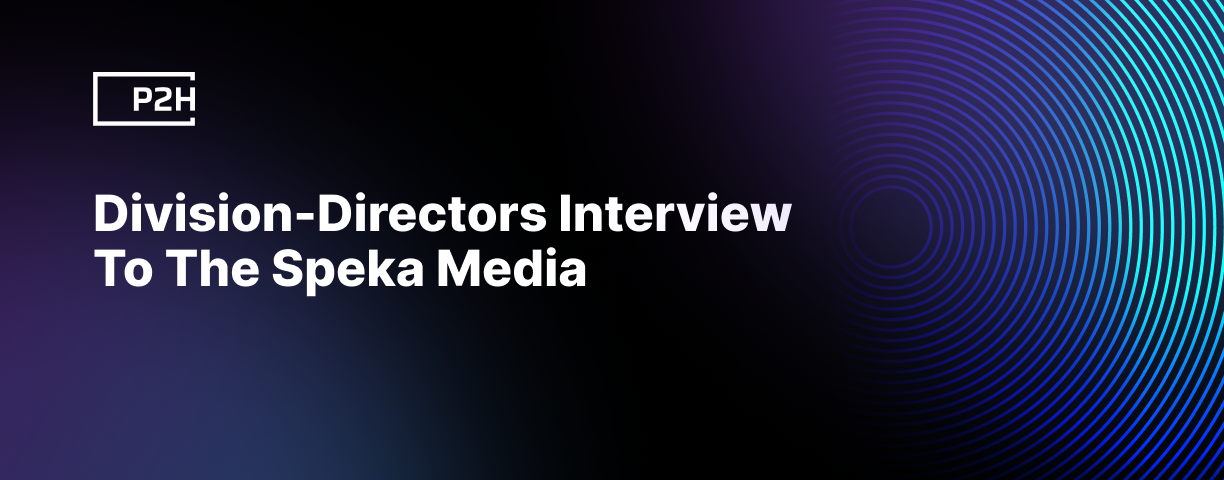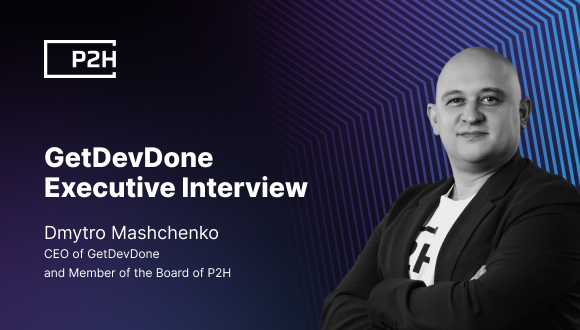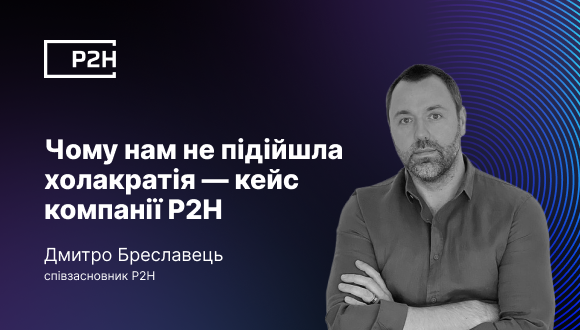
For over 17 years, P2H has been a reliable software development company in the global market. Strong management principles give us stable business growth, international recognition, and the trust of customers, even in new markets.
Recently, Ukrainian IT media SPEKA has published an interview with Dmitry Maschenko and Mykhaylo Zakharov, P2H’s division directors. They shared insights on managing projects and teams in the sphere of technologies. Read the article to find out:
- How to build business processes and develop digital solutions for the Kingdom of Saudi Arabia?
- What are the principles and values of the P2H team?
- What kind of changes did we have to implement because of the full-scale Russo-Ukrainian war?
Research shows that companies with strong values achieve better financial results and grow faster, and their clients and employees feel more satisfied. Since the outbreak of full-scale war in Ukraine, the matter of values has acquired special importance both for local and international companies.
Together with P2H IT, the editors of the Ukrainian online IT and entrepreneurship publication SPEKA are initiating a special project on the values of the leading Ukrainian IT companies. Our series of articles will cover the fundamental principles of product, outsourcing, and marketing businesses, as well as how companies’ values have changed since 24 February 2022, the day the war began.
In the first article of the series, we bring you the story and values of P2H, an IT company with Ukrainian roots, and our partner in this project. P2H employs over 500 experts and celebrated its seventeenth birthday this summer. For several years now, the government of Saudi Arabia has entrusted P2H with the development of digital solutions for the state.
One distinguishing feature of P2H is their flat management structure, which is unusual in the Ukrainian market. They have no middle management, and any employee can speak straight to the directors. SPEKA talked with P2H Main Division Director Dmytro Mashchenko and Custom Division Director Mykhailo Zakharov to learn more.
The history of P2H
P2H was founded by Dmytro Kucher and Dmytro Breslavets, developers and entrepreneurs from Kharkiv. They started developing web solutions back in the early 2000s and were the first developers to convert HTML and CSS web page design into a stand-alone service. Having recognized that this was a promising niche, the two Dmytros established their first company, PSD2HTML, in 2005 and later transformed it into P2H.
The founders were right — the demand for such services grew exponentially. By 2007, they had already employed 50 people in their Kharkiv office. By 2013, the founders had acquired several competitors, and the team grew to hundreds of employees. In addition, the company opened a development office in Nepal.
The company refrained from further acquisitions and opted for organic growth, mainly due to exploring new business areas. Dmytro Mashchenko said that the demand for more complex projects grew as the market developed. New requests from clients went beyond work with the simple web solutions for which P2H was established.
Dmitry Maschenko
Main Division Director
“In our main business, we had a rapid inflow of orders; we received an order and returned the code within a couple of days, or a month at the most,” said Mashchenko. “But things changed, and it wasn’t as easy when a big client made a product request where we needed to research and analyze the market and work closely with the client.”
For that reason, the company established a separate delivery unit in 2013 to work with complex and long-term projects. The company has been divided into two units ever since:
- The Main Division offers relatively quick web development, working with thousands of clients from the USA, Canada, Australia, and Western Europe (digital agencies and SMEs) and fulfilling 100-200 orders a month.
- The Custom Division deals with large and complex projects that may take years to realize. The main clients of the Custom Division include governmental agencies from Saudi Arabia and large US companies.
Mykhailo Zakharov joined the Custom Division in 2015. First, he headed the sales department, and within a year, he became head of the whole delivery unit. Before long, the company attracted clients who provided them with work for several years ahead. During this period, Mykhailo’s team grew from 45 to almost 200 people.
Digitalizing Saudi Arabia
One of the governmental ministries in the Kingdom of Saudi Arabia was looking for a contractor to develop a digital platform that would protect the rights of expatriates seeking employment in the country. After a successful launch, the solution was scaled and later transformed into a platform serving all aspects of business in Saudi Arabia — work permits, registers of employees, labor relations, transfer of employees from company to the company, certifications, visas, and more.
Mykhailo Zakharov
Custom Division Director
“Eventually, this grew into a business domain, an e-government system encompassing almost all aspects of the country’s business life,” said Mykhailo Zakharov.
Later, the client contracted P2H for other products, including platforms for NGOs and recruiting employees.
P2H’s development of a donation platform for Saudi Arabia is another success story. For Muslims around the globe, religious holidays are periods for sacrifice and donating to those in need. But the centuries-long tradition of giving faced a challenge in 2020 because of the COVID-19 pandemic. P2H’s technology experts helped to quickly solve the problem by creating a digital solution to make and distribute donations.
Thanks to P2H’s solution, “instead of going to the mosque and putting money into a box, Muslims could now donate from their desktop, smartphone, or even a large touch screen in a parking lot, supermarket, and other places,” said Mykhailo.
P2H’s projects for the governmental institutions of Saudi Arabia have become the backbone of the domain expertise that P2H now offers to other Middle Eastern countries, which has contributed to scaling P2H’s Custom Division business. Zakharov believes that P2H’s achievements can also benefit Western European countries.
P2H principles and values
P2H is one of the few Ukrainian IT companies with a flat management structure.
“In this structure, management helps employees to do their job instead of assigning tasks to them,” explains Dmytro. The company basically has no middle management; employees, and the management team, just take responsibility for themselves and do their jobs. Self-organized development teams follow certain principles to unite and achieve optimum results.
“Yes, we have managers, leads, and directors, but this is not a hierarchical structure; it’s just various functions performed by peers,” adds Zakharov. “Anyone can speak to me or Dmytro directly.”
According to Zakharov, the flat structure, interesting projects, and professional development opportunities form the company’s identity, attract new employees and motivate team members to stay with the company long term. P2H boasts a very low personnel turnover rate, so many employees have worked for them for 13–15 years.
P2H has no strict rules or instructions that contradict the concept of a flat structure, which presupposes much freedom. The company’s value system is the basis for everything: communication with colleagues, making important decisions, and collaborating with clients. P2H encourages employees and teams to be proactive, open to new ideas, and seek professional development.
One of the core values of the company can be worded as “Display initiative.”
“If you can change something, so the company works better, just do it,” said Dmytro Mashchenko.
P2H grants employees trust that they can implement their ideas. It’s not a problem if mistakes occur. “We’re against punishment. In a flat structure, punishment is avoided. An employee may try something, make a mistake, gain insight, and improve their idea,” said Mashchenko, “but if you undertake an initiative, you also undertake responsibility for accomplishing it. The company, in turn, offers resources to implement new ideas.”
Mashchenko added that another pillar of P2H is open communication. “I often tell the team there are no wrong questions; there are only questions that haven’t been asked. Don’t hesitate to ask. This will improve your life and work, even if the questions seem silly. Our founders participate in our general work-related chat, so anyone can get in touch with them at any time.”
What’s more, P2H maintains a focus on developing the technical potential of their employees because the directors believe that lifelong learning promotes not only personal growth but also the growth of the company.
“Every Thursday, we have knowledge-sharing meetings for employees, where anyone can share their expertise with others. This is a simple discussion format, where, for example, a QA specialist may learn something new about business analysis or a programmer may learn about technical interviews with candidates. Thanks to the cross-section of competencies among our employees, they bring up really good questions and offer exciting answers. We believe this is one more way we drive the growth of our company,” said Zakharov.
“Protect your team and project. The openness of relations requires a caring attitude toward colleagues and clients. Otherwise, relations will inevitably lead to conflicts. That is why we don’t work with toxic people, even if they have excellent hard skills. People’s character should be the force for good — it shouldn’t interfere with people being effective and happy in their work,” added Mykhailo Zakharov.
Another P2H principle is the refusal to work with post-Soviet countries, primarily the terrorist states. PH2’s Main Division is 100% oriented toward the Western market, and the Custom Division is oriented toward the Middle East and the West.
P2H and the war
The breakout of full-scale war allowed P2H leaders to prove that people are of the utmost importance to the company. At the start of the war, most employees were located in the Kharkiv region and other eastern regions of Ukraine. P2H’s leaders organized the evacuation of its employees from dangerous areas.
Most P2H’s people barely slept in the first couple of weeks. The company provided transportation and staff members monitored and navigated traffic to make sure people arrived at prepared locations in western Ukraine and abroad. Our employees’ ability to self-organize and help each other at work was a key strength in a critical situation.
Several P2H employees found themselves in temporarily occupied territories – in Kharkiv and Zaporizhzhia regions. However, all managed to evacuate later. The company held their jobs for them and for colleagues in the ranks of the Armed Forces of Ukraine who defended, and continue to defend the country.
“People knew that the company cared about them, and in return, our employees continued to work hard and offer assistance to their colleagues,” said Mykhailo. “We didn’t need to ask anyone to work; the company never stopped operating. Only from the 24th–25th of February (dates when the invasion commenced) did we tell clients we needed to take two days off. But some team members kept working and stayed in touch with clients even during those days.”
Our clients repaid us by expressing solidarity with Ukrainians and providing financial support and housing for our employees in Poland and other European countries. What’s more, they offered to postpone deadlines, but we found it unnecessary in most cases.
Currently, most P2H employees — almost 100 — are staying in Lviv. Many went abroad. Others are scattered around Ukraine, mostly in its western part. “But we also have over 30 people in Kharkiv. Some went back, some never left,” said Zakharov.
Like many other companies, P2H adapted to remote work during COVID times. Before the pandemic, 5–7% of employees worked remotely, and this figure soared to 70% during the pandemic. Therefore, the ensuing intense battles in Ukraine haven’t impacted our production process very much.
Still, during regular get-togethers, many employees dream of going back to Kharkiv, the place where P2H started seventeen years ago, and which has been or has become very dear to many of them.




